At Little Scholars, we have four pillars that underpin everything that we do at Little Scholars – for our children, families, educators, and our community.
As part of our annual awards, we have four awards dedicated to those Little Scholars’ values – learn, grow, inspire and contribute. This year, while our award-winning educators certainly personify all four pillars, but with their unique special skills and achievements, we’ve declared one clear winner for each pillar.
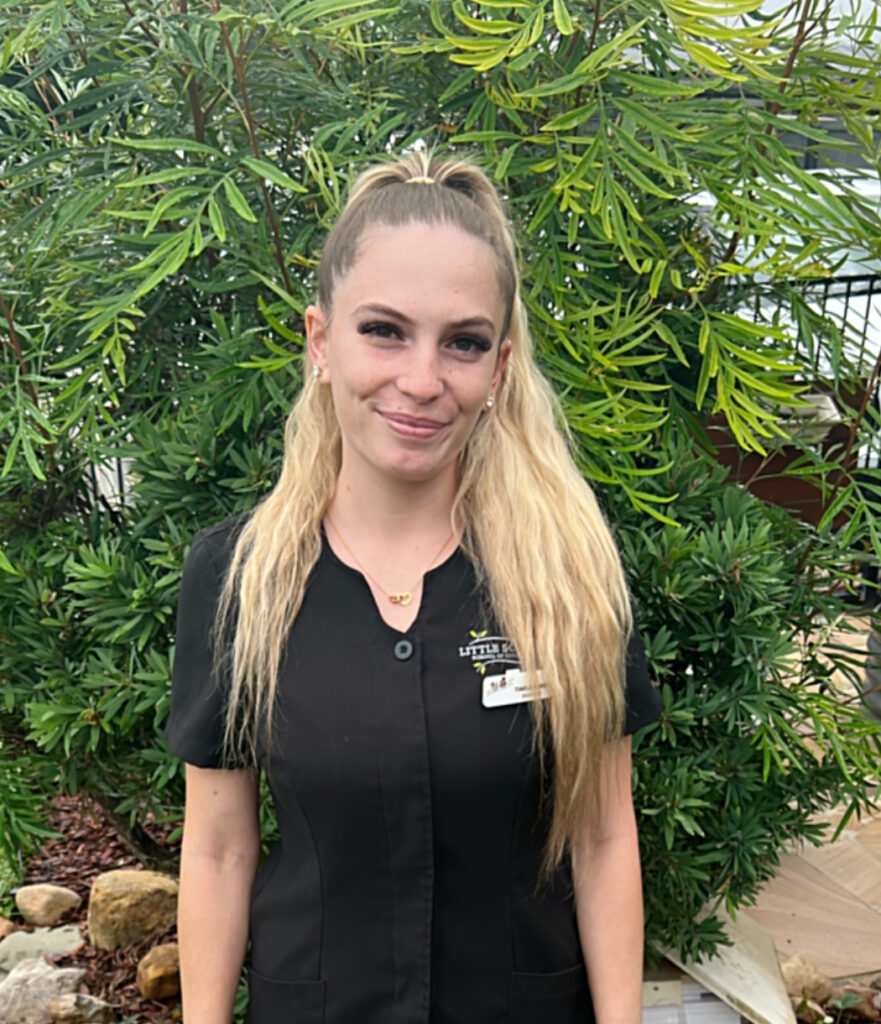
Tiahla at our Ashmore campus was named winner of the Pillar Award in the Learn category because she stepped up to become a lead educator, and she is happy to keep learning from her peers and further her education in the sector.
How long have you been an educator?
Four years
What made you pursue a career in early childhood education?
I feel like it was supposed to be as it all fell into place. I just came out of a casual job seeking for a new career journey and a job at Little Scholars Ashmore popped up. I applied for it and received the role the exact same day.
What’s the most rewarding and most challenging parts of your role? Watching their personalities blossom from a very young age, celebrating their personal developmental milestones with the children and building amazing relationships with families.
The most challenging part would be watching the children you have taught over the years move on to big school. We miss them so much!
What does winning this award mean to you?
Winning my award has meant the world to me, it makes me feel as though my progression and my achievements as an educator are noticed and valued.
Tahlia’s nomination
“Tiahla is always putting her hand up to learn new skills,” says Elise, campus manager for Little Scholars Ashmore.
“She is eager to grow from her peers, and will ask for help and support to build on her knowledge as an educator.”
Tiahla finished her Cert III and was keen to study her Diploma right away, Elise says.
“Tiahla has a bright future as an early childhood educator, as she values the importance of professional and personal growth through learning and collaborative partnerships.”
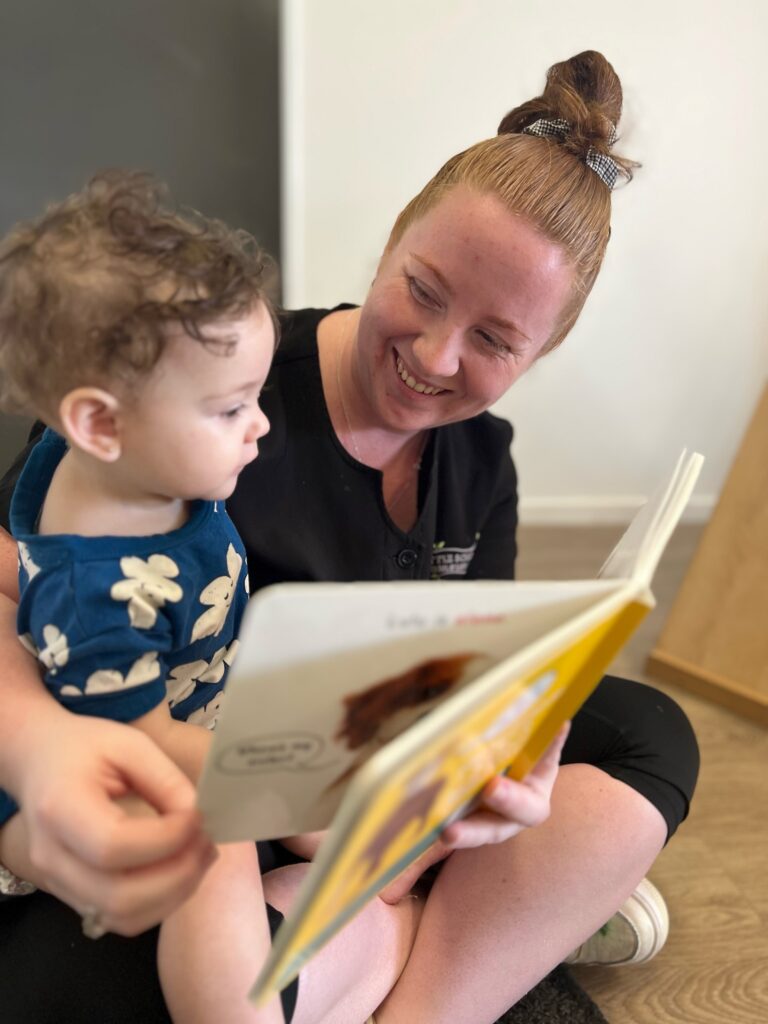
Keeva is an educator at Little Scholars Redland Bay South and is the recipient of an Inspire Little Scholars Pillar Award 2024.
How long have you been an educator, Keeva?
I have been an educator since 2016, so eight years now and have been with Little Scholars Redland Bay South since January 2023.
What made you pursue a career in early childhood education?
When I first started in early childhood education, I was studying an accounting degree, I quickly came to realise that I wanted to focus on my early childhood career. I fell in love with the children, how incredible they are and how much they could teach me. It wasn’t just the children that I fell in love with but also the challenges and limitless knowledge I could acquire and learn from to be the best educator possible.
What’s the most rewarding and most challenging parts of your role?
The most challenging part of my role is that I want to spend as much time as possible with each individual child everyday teaching them and learning from them but there is not always enough time. The most rewarding part of my job is watching the children hit all their goals and the excitement they display when they see us or accomplish goal. Mentoring and supporting other educators and seeing how far they have come in their journey is another rewarding aspect always leaving me feeling proud of their accomplishments.
What does winning this award mean to you? I was so shocked to receive this award, as I just turn up to work each day to do my best to support and guide both the children and educators. It felt so good to know that what I do each day is being noticed. It definitely makes you feel like you are doing a great job. To be recognised for the support and guidance I provide was so special and my heart felt full of love for my team. To me it cemented the fact that I am becoming the educator I always wanted to be
Keeva’s nomination
In Keeva’s nomination from Redland Bay South campus, it said, “Keeva is an educator who truly embodies each of the little scholars core pillars.
However, it is Keeva’s ability to inspire those around her, that is one of the most outstanding qualities. Keeva invests in mentoring those around her, inspiring their abilities to grow as educators utilising her existing knowledge and ability to learn more through professional development, to inspire each person to grow to full potential.”
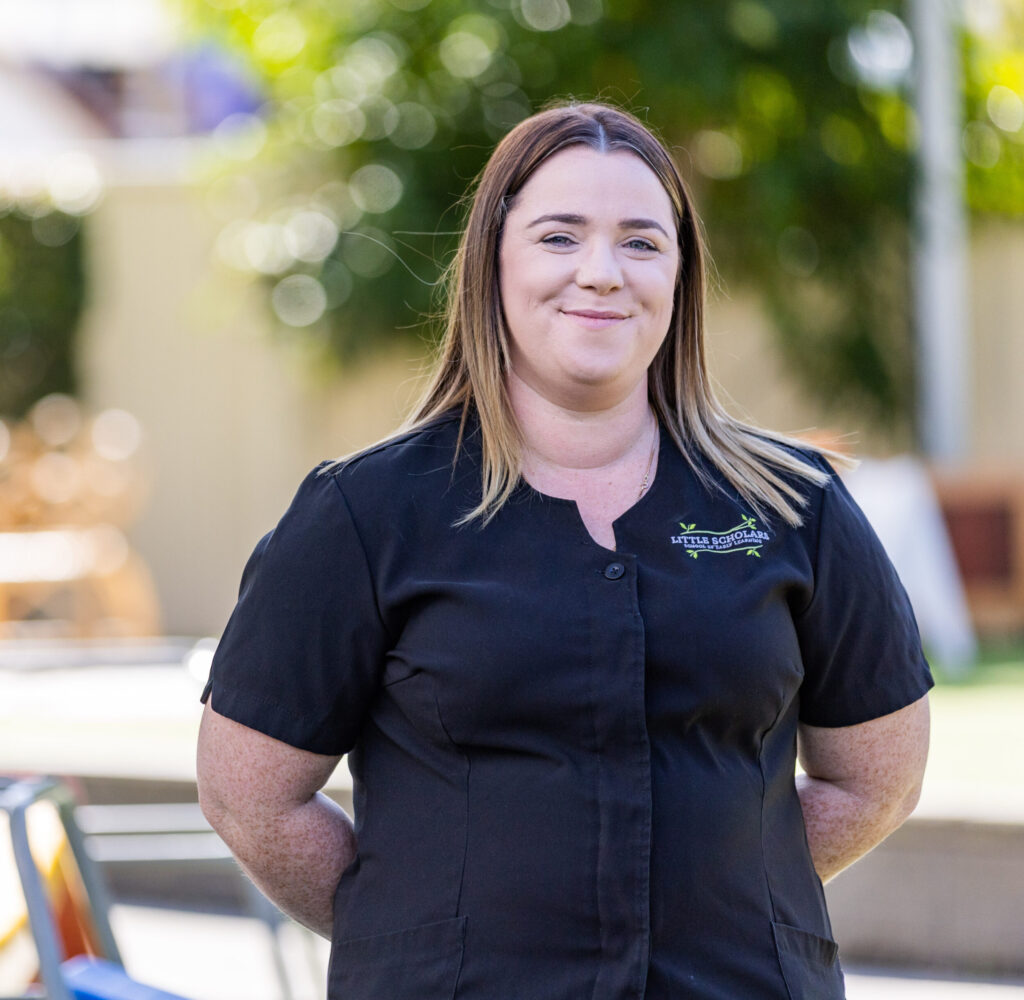
Claire is the educational leader at Little Scholars Nerang campus and has been awarded the 2024 Contribute pillar award.
How long have you been an educator and how long with Little Scholars?
I have been an early childhood educator for 18 years and with Little Scholars for nearly six years.
What made you pursue a career in early childhood education?
I’m not quite sure when I decided this was the path I wanted to take as I feel like it’s been my career goal since I was little. I still remember the way one of my kindergarten teachers, Miss Anderson, made me feel. She was fun, caring, and knowledgeable. I wanted to be that for someone and help children to learn in their own time and style. I liked the idea of being able to help shape the minds of little ones and set them up to be kind, respectful humans.
What are the most rewarding and most challenging parts of your role?
As educational leader within my campus, the most rewarding part of my role is watching both the children and educators flourish and grow as humans. It fills me with so much pride to watch the children reach their milestones and celebrate their successes with them as much as it does when educators gain new skills that help them in their professional career.
My biggest challenge is saying goodbye to the children as they venture off on their next journey into formal schooling. It happens each year but never gets easier to see them go after watching them grow and develop over the years.
What does winning this award mean to you?
Winning this award makes me feel like I am on the right path to creating what I hoped to. It reinforced the fact that I am in the right career and doing the right things to help create a better future and bring our campus closer to our local communities. I feel so proud to be recognised as the 2024 contribute pillar winner.
Claire’s nomination
Renee, campus manager, said, “Claire has remarkable attributes and will contribute to anything and everything you can throw at her.
She is passionate about supporting others and always willing to participate in any type of event, including her own professional growth.
Claire is dedicated within our Little Scholars family and her years with us is another wonderful example of her contribution to our sector.”
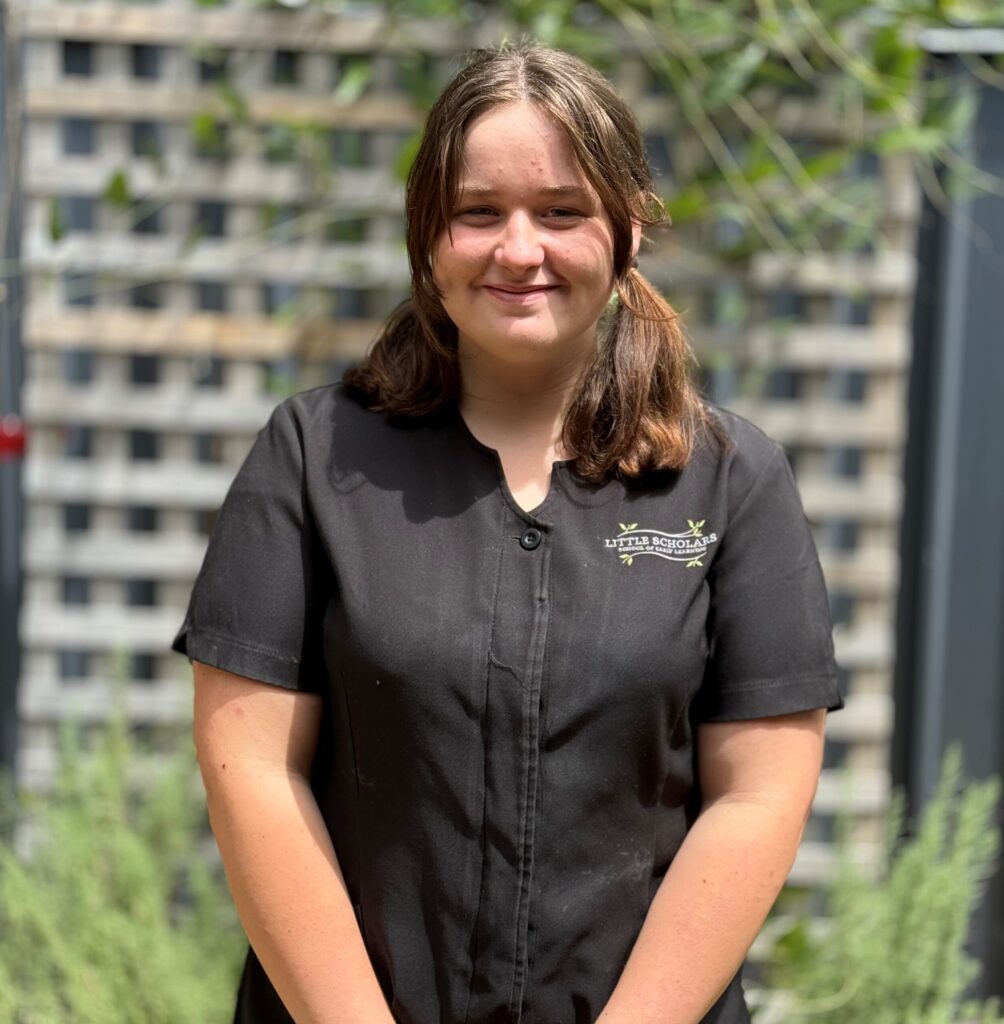
Stefenie, an educator at our Yatala campus, has remarkable attributes and we’re told her growth as an educator has been propelled by her enthusiasm to contribute, learn and inspire her team and go above and beyond not only for children, but families as well.
How long have you been an educator and with Little Scholars?
I have been an educator with Little Scholars for three years.
When you started, what was it about the role that made you want to stay in the sector?
When I was completing my work experience at the Yatala campus, I loved the relationships I was building with the children and I could see the impact educators had on the children.
What’s the most rewarding and most challenging parts of your role? The most rewarding part of my role is building such strong relationships with the children. The most challenging part is because I am so use to the younger age group, when I’m with the older children, I have to adjust my teaching style and interactions to their age groups.
What did being recognised for the Grow award mean to you?
It was really special because it really made me see how far I’ve come since being a 16 year old school based trainee. My confidence with the children and families, as well as my knowledge on child development has strengthened so much. I am a completely different educator and the fact that my leadership team can see and recognise it, it is a very special feeling.
Stef’s nomination
Stef at our Yatala campus was named winner of the Pillar Award in the Grow category because she’s grown from a trainee at the campus just a few years ago to now full time educator.
Sasha, campus manager at Little Scholars Yatala had this to say:
“Stef! What a superstar you are, and what a year you have had! From completing your Cert III as a school based trainee to jumping straight into full time work with us and then to go straight to studying your Diploma, nothing can stop you from achieving your goals, and we are so proud of how far you have come and the growth that you have achieved.”
For anyone who’s ever tried to learn a new language, you can probably attest to the fact it’s challenging. You think in one language and translate into another. There are new tenses, jargon, sentence structures, plurals versus singular words, never mind having the muscular movement necessary to form words with your mouth, the confidence to speak – we could go on and on. Now imagine what it could be like for a baby or small toddler?
There are benefits of course for children learning their mother tongue, or even a second language compared to adults learning language. According to German researchers, the melody of newborn babies’ cries is shaped by the sounds of their native language, which they hear in utero. Babies even babble in their first language. Wait, what? Meaning, from a very young age, they start copying the sounds and rhythms of the language they hear around them. This means they begin to use the same ups and downs in their voice (intonation) and the same timing as the language spoken at home. Plus, when babies babble, they often use the most common sounds (like consonants and vowels) from their family’s language. As babies continue to develop, their babbling starts to sound more like conversation, referred to as jargon, with a rhythm and tone resembling adult speech.
Fascinating, isn’t it?
So, how can you help your baby learn to speak? First, remember babies all develop at different ages and stages, so while some of their peers may be speaking, others may be more focused on movement, fine motor skills or something completely different.
Babies learn to communicate by listening to the people around them, especially their parents. They will:
Chatting with your baby is important, and it’s even better when it’s just the two of you. When it’s just parent and baby, without other adults or children around, baby talk can really work its magic. And when your little one tries to chat back, give them your full attention – it shows them you’re interested in what they have to say, and they’ll be encouraged to keep going.
It’s important to note that too much screen time isn’t great for babies’ language development. Australian and international guidelines suggest that children under two should ideally have no screen time, except maybe for a bit of video chatting. After all, your baby will find you way more interesting than any screen!
It’s great to use that sing-song baby talk voice, as babies love it. But don’t forget to mix in some regular, adult conversation too. Hearing how words are used in everyday talk is a big part of how your baby learns language.
You might know by now that it’s Little Scholars philosophy that children learn best through play. So with that in mind, we had some ideas about how you can play with your baby and help him or her learn to speak at the same time.
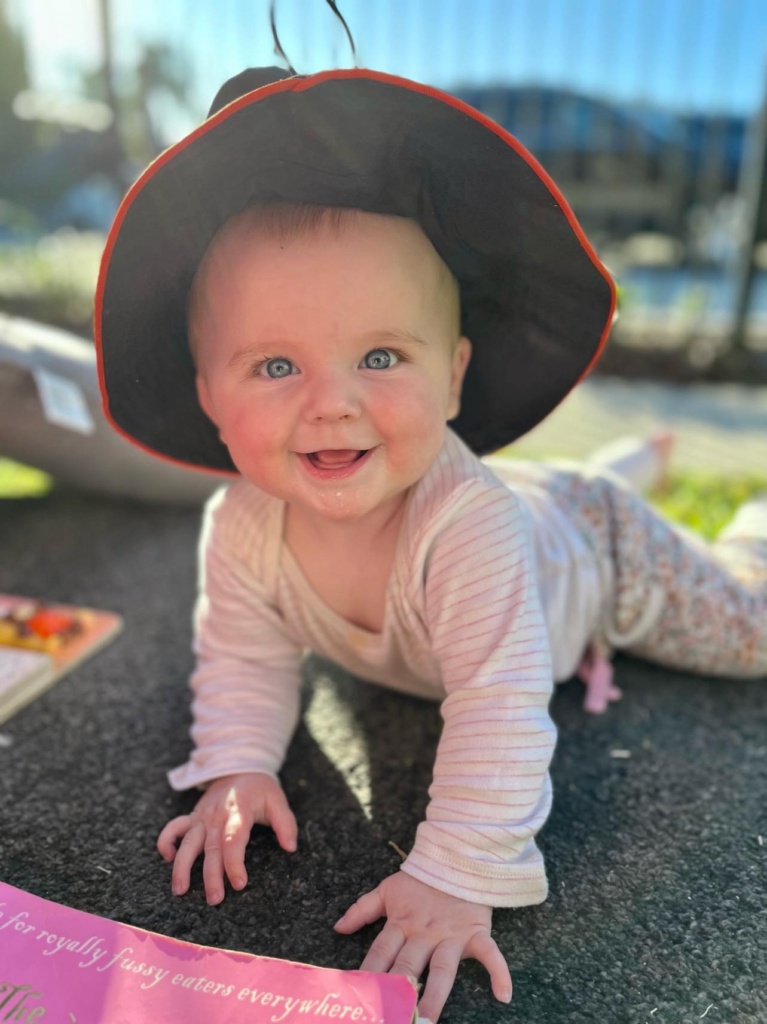
Sasha is a lead educator in one of the toddler studios at Little Scholars Burleigh. She says the Abecedarian Approach is one of her favourite tactics for supporting language development, especially when she’s reading with just one or two children.
“It’s a great way to have back and fourth conversation, for example ‘I can see a horse, can you show me where the horse is?’ or ‘I can see you’re pointing to a monkey, can you find anymore monkeys?’ another one could be ‘I can see you’re point to a dog, what noise does a dog make?’
“It’s not only conversational reading,” Sasha continues. “But also just communicating throughout experiences, if a child is stacking a block on top of another block communicating that action that the child is doing.”
Nikki, the lead educator in the nursery also at our Burleigh campus, says utilising one-on-one periods during routines and rituals, such as nappy changes, washing hands and faces, sunscreen times, are a great time to be talking to the children about what they have been and are doing, ‘we are putting our sunscreen and hats on so we are sun-safe to go outside,’ for example. They also name body parts during the process.
“We always warn the children if we are about to touch their bodies in order to help them, like for nappy changes or sunscreen application, and dictate what is happening to them, so we are verbalising every step,” Nikki says.
“We also talk through the steps at rest times as we place the children in their cots or walk into the cot room, saying ‘we are going to rest our bodies and have some sleep now, I will see you when we wake up and we will do ___’. Basically, we are constantly narrating to the children their every move,” Nikki says.
At our Deception campus, Hayley, lead educator of the toddler studio, does the same thing, but adds a little twist.
“I do a lot of singing, and turning things into songs!” says Hayley. We think that’s a great idea, research shows that singing can help with language development, memory, and even emotional regulation. Singing also has many physical benefits, like improving breathing and posture, and help with early literacy.
“I also think it’s important to be at the child’s level. Talking clearly, and using simple sentences, as well as showing interest when they are speaking to you,” Hayley adds.
Social media can be a great source for parents, so when it comes to baby speech, we’ve got a few we recommend.
Firstly, for all things child-development and early learning, @littlescholarsearlylearning
Then specific for children’s speech development tips, tricks and support, we like these Instagram accounts:
Remember, if you’re worried about your child’s speech development, talk to your GP who can advise or help you with next steps to support your child.
Speech development chart information from Speech Pathology Australia
We adore the endless stream of questions that little ones bring to us every day! From an early education standpoint, we want children to learn at every opportunity. Children are inquisitive beings, and they have lots to learn! At Little Scholars, we cherish this innate curiosity in children and strive to foster a lifelong passion for learning.
As parents and educators, we understand that some questions from our little ones can catch us off guard, leaving us searching for the right words to provide age-appropriate answers. We’re here to lend a helping hand, so let’s tackle a few of these tough questions together!
How are babies made/how did a baby get in a mummy’s belly?
Children at this age are curious about the beginning of life. You can answer simply, “A tiny seed, called sperm, from the daddy joins with a special egg from the mummy, and that’s how a baby starts to grow inside the mummy’s belly.” They may understand it like a fruit grows from a seed. For young children, this should satisfy the question. You may want to explain it’s not the same kind of egg we eat for breakfast!
What does dying mean?
The concept of death can be challenging for young children to grasp. We think it’s important to be honest here. You can say, “Dying means that a person’s body stops working, and they don’t feel pain anymore. They don’t breathe, eat, feel hungry or cold. It’s a natural part of life’s cycle, like when leaves fall from a tree in the autumn.” This is a topic that may be followed up with further questions, such as ‘will I die or will you die?’ and be honest. “Yes, we all die. But I hope to be around for a really long time. I have no serious illnesses that could change that.”
What happens to us when we die?
For toddlers and preschoolers, you can offer a comforting response like, “When someone dies, they become like a beautiful memory in our hearts. We remember all the happy times we shared with them, and they will always be a part of us.” If your family has cultural or religious beliefs around death, this may be the place to share, “in our family and our culture/religion, we believe when the body dies ______.” Your child may work through this further through their play, but just be there for them and prepared to revisit this topic.
How come Louis has two dads?
Children may notice different family structures. You can say, “Families come in all shapes and sizes. Louis is very lucky to have two dads who love and care for him just like your mummy and daddy love you.”
Why does Ashley’s mum live in a different house from her dad?
When answering a small child’s question about why a couple has divorced, we think a simple, honest, and age-appropriate response that takes their emotional well-being into consideration works best. Here’s one way to address the question: “Sometimes, mummies and daddies decide to live separately because they have found they feel happier when they have some space. It’s like when friends need some time apart.
If it’s your separation, your child will need a lot of reassurance from you. “Even though mummy and daddy won’t be living in the same house, we both still love you very much, and we will always be there for you. You will have special time with both of them, and we will continue to love and care for you in different homes.”
Young children may have a limited understanding of complex situations like divorce, so keeping the explanation simple and reassuring them of their parents’ love is crucial. Encourage them to share their feelings and questions, and assure them that it’s okay to talk about their emotions. Creating a supportive and open environment helps children navigate through changes and emotions in a healthy way.
What happened in the news that’s making everyone so sad?
Addressing sad news can be tricky. Open the discussion by asking your child what they know about what’s happened in the news. This is a good opportunity to correct false information and provide context. Remember to use age-appropriate language. Check your child’s understanding throughout the conversation and allow them to ask questions. You can say, “Sometimes, sad things happen in the world, and it can make people feel upset. It’s okay to feel sad or worried, and we can always talk about our feelings with someone we trust. You can always talk to me about anything.”
Why is the sky blue?
The secret behind the blue sky lies in something called “Rayleigh scattering”. It’s a fancy scientific term, but it’s a super interesting phenomenon that helps us understand why the sky is blue. When sunlight enters the Earth’s atmosphere, it interacts with tiny particles like dust, water vapour, and pollen. This mixing causes the sunlight to scatter, or spread out, in all directions. When light waves hit these particles, they bounce off and scatter in different directions, just like water droplets scatter after you throw a rock into a pond.
Now you might ask, “Why is the sky blue and not another colour?” That’s because blue light has a shorter wavelength than other colours of light, like red or yellow. Shorter wavelengths scatter more easily when they interact with the tiny particles in the atmosphere. So, when we look up at the sky, we see more blue light than other colours.
But guess what? The sky isn’t always blue! Sunrises and sunsets are not only beautiful but also full of science. The colours we see during these times depend on the angle of the sun and the distance its light travels through the atmosphere. The lower the sun is in the sky, the more atmosphere the light has to pass through. This causes shorter wavelengths, like blue and green, to scatter more, leaving the longer wavelengths, like red and orange, to dominate the sky. That’s why we see those breathtaking colours during sunrises and sunsets!
Clouds, pollution, and weather can also change the sky’s colour, making it look grey, white, hazy, or yellow.
Where do birds go at night?
Children might wonder where birds go when it gets dark. You can say, “Birds have special nests or cozy spots where they rest at night, just like we have our beds to sleep in.
How do plants grow?
Children might be fascinated by the growth of plants and flowers. You can say, “The plants have roots at the bottom that absorb water and minerals in the ground, and then the stem starts growing. With the help of the sunlight, the stem grows in branches. Green leaves start growing out of the branches. The five things plants need to grow are sunlight, water, minerals, and food..
Why do we have seasons?
Seasons happen because the Earth goes around the sun. The Earth travels around the sun, called an orbit, once a year or every 365 days. As the Earth orbits the sun, the amount of sunlight each location on the planet gets every day changes slightly. This change causes the seasons. When it’s closer to the sun, it’s warmer, and when it’s farther away, it’s cooler.
Where does rain come from?
Children may be curious about rain and weather. Sunlight heats up water on Earth’s surface. The heat causes the water to evaporate/dry up into the sky, or to turn into water vapor. This water vapor rises into the air and makes up clouds. As the water vapor cools, it turns back into water, in the form of droplets or rain drops.
How do airplanes fly?
Little ones might be fascinated by airplanes in the sky. “Airplanes have special wings that help lift them into the air. When they move forward, the air goes over and under the wings, which creates lift and allows the airplane to fly.”
If they have follow-up questions, we liked the answers from Britannica Kids.
Why do I have to go to bed early?
Children may question bedtime rules. You can say, “Going to bed early helps our bodies and minds rest and get ready for a new day of fun and learning.”
Why do I have to eat vegetables?
Answer with something like, “Vegetables have special nutrients that help our bodies grow strong and healthy. They are like superhero foods for our bodies! We need a variety of food that have different types of nutrients so our bodies can get everything they need to be the best they can be.
How come your body doesn’t look like mine?
We bet you thought the puberty question would come later! But nope, your child has noticed there’s a slight difference between their bodies and their parents’ bodies. We know this can feel awkward to answer, but your child doesn’t understand why it could be hard for their parents to explain, so use proper words and keep it simple.
It’s okay not to have all the answers, and it’s perfectly fine to keep explanations simple and age-appropriate. If you don’t have the answers, you can look it up together. By embracing your child’s questions and engaging in open conversations, you’re nurturing their curiosity and building a strong foundation for their learning journey. Be sure to let your lead educator know you’re having these conversations at home. Your child is likely not the only one wondering some of these questions, and your educators can find ways to help them understand life’s curiosities!
If you’re a parent of more than one child, or spend time with children of varying ages, you may already see the benefits of those children interacting with each other. In early learning, while we arrange for children of similar ages or development together most of the time, we do make time and space for children to spend time with older and younger children. Why? There’s a lot of research supporting children of various ages and abilities spending time together. We’ll look at a few of these studies and hear from some of our Little Scholars educators who can attest to the advantages of mixing things up!
As an early education provider, we tend to group children together who share similar abilities, who are at similar stages of development or of similar ages. The benefits of this include:
Keeping children together of similar also means they’re stimulated appropriately at each age. Educators can tailor the curriculum to meet the specific developmental needs and milestones common to that age group, making learning more targeted.
As well, being with peers at the same developmental stage allows for more accurate assessment of a child’s progress and needs, aiding in early identification of any learning or developmental challenges, and children of the same age often share similar interests and play preferences, making it easier to form friendships and social bonds.
With a narrower age range, the skill gap between the most and least advanced children in the class is reduced, making group activities more cohesive, and children may feel more at ease and less intimidated when surrounded by peers who are at the same developmental stage, boosting their confidence in social and learning situations.
It also allows educators to be able to use age-appropriate language and teaching methods that resonate with the entire room, making instructions and lessons more effective.
It’s of course true that within ages of studios, for example the nursery, the milestone range can be large – a six month old infant isn’t at the same place a 12-month-old is, and even a 15 month old, but they’re similar enough in their needs that it makes sense to group them together. Our educators plan experiences that focus on movement skills, language development, fine motor development, and strengthening of developmental milestones based on the interests of the babies and research.
For toddlers, who are roughly 18 months to three years old, most are walking by this stage, some of them are learning to speak, sharing with other children and becoming potty trained. For toddlers, the curriculum includes a lot of opportunities for little ones to move their bodies and expel some of that endless energy, but a big focus is on communication and language development, which is why we help your child get to know sounds, words and language, including early literacy and numeracy and social and emotional development.
Then of course, there are our three to five-year-olds, who are further developing their language and literacy skills, fine and gross motor development and more. They are learning to work together in groups as well as individually, all in the build-up to formal schooling.
This is all to say there’s important reasons why our little scholars generally are grouped within similar ages and abilities in their studios. But this does not mean we don’t want them interacting with other children! The opposite, in fact.
The idea to mix aged groups in early learning is of course not a new concept. Here’s two of many theorists of early childhood who supported the idea of bringing children together of mixed age and abilities.
Maria Montessori, the founder of the Montessori method, was a strong advocate for mixed-age classrooms. She believed that older children could serve as role models for younger ones, fostering a sense of community and collaborative learning.
“One of the most important aspects of our education system is the use of the mixed age group which allows all the children to find what is suitable for them, irrespective of their age, and which allows the younger children a graded series of models for imitation, and the older ones the opportunity to reinforce their own knowledge by teaching what they know.”
Now, Montessori classrooms often have children of varying ages working together, which she believed promoted social and emotional development.
Lev Vygotsky, a Russian psychologist, also supported the idea of mixed-age play through his theory of the Zone of Proximal Development (ZPD). According to Vygotsky, children can learn more when they interact with peers who are slightly more advanced than they are. This aligns well with the concept of mixed-age play, where older children can guide younger ones, helping them to reach higher levels of understanding and skill.
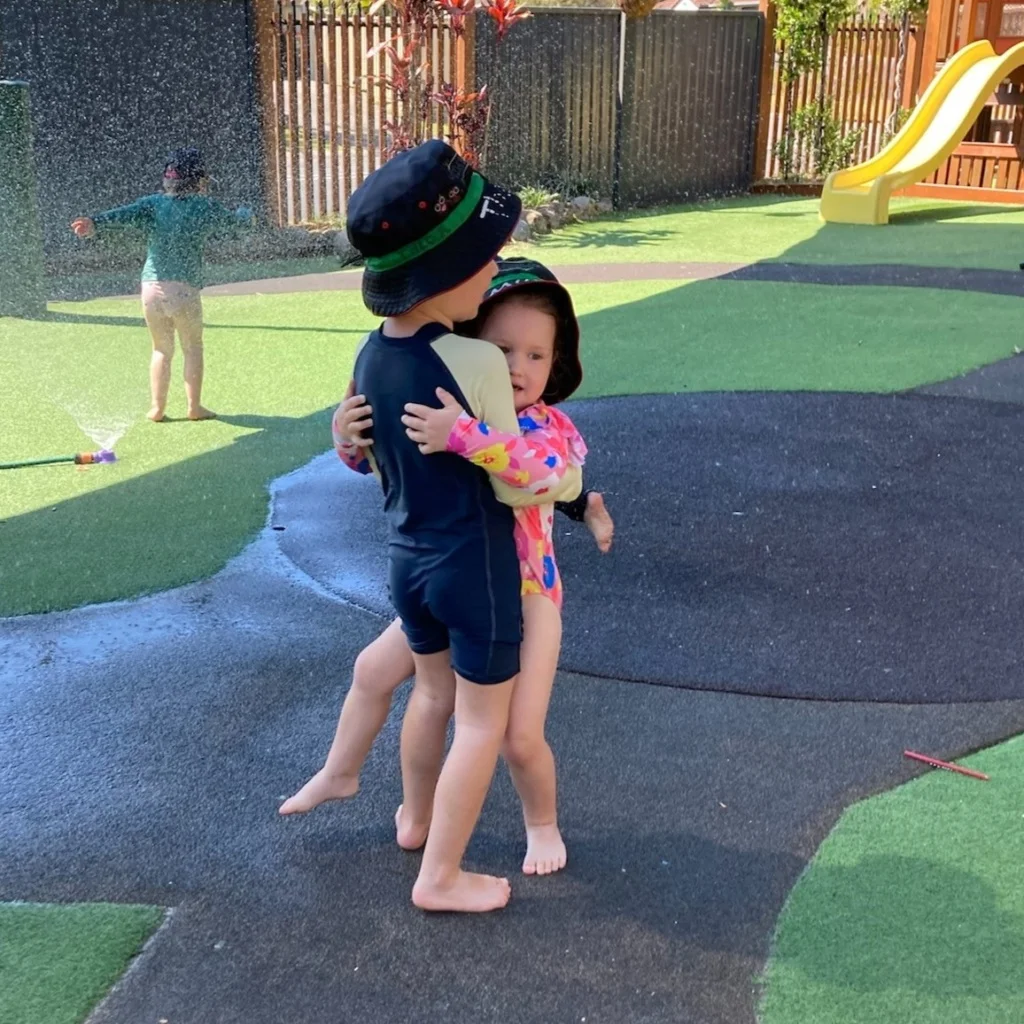
Theo (5) and little sister Mila (3) often get to spend time with each other at our Nerang campus, despite their age difference!
The benefits to having children visit with different age groups are plentiful.
Older children provide leadership and support to younger ones, enhancing skills and confidence for both.
At all of our campuses, there are several sets of siblings. By allowing siblings to interact, it can help younger ones adjust to the care environment.
Even if children don’t have siblings at their campus, mixing with younger children gives them the chance to take on ‘big sibling’ roles.
The benefits also include:
Fosters tolerance and diversity, benefiting children with developmental delays as well.
“I believe that children should have the ability to socialise with children of various age groups,” says Claire, the educational leader at Little Scholars Nerang. “Allowing opportunities for siblings to group together while at the service can assist children to feel a sense of belonging and ease separation anxiety throughout the day.”
For younger children, they can learn from a peer more knowledgeable than themselves, it teaches them problem solving skills and more, says Claire. For the older children, it teaches them nurturing, patience and understanding.
Claire shared a story of one mixed age grouping of two children who weren’t related.
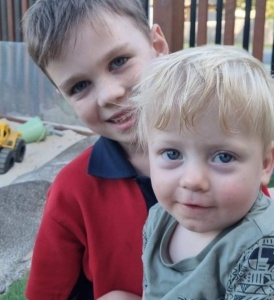
Jacob and Finn are six years apart, share a birthday and have a unique bond at Little Scholars Nerang
“Jacob and Finn are six years apart. Finn began his Little Scholars journey at four months old and took an immediate liking to Jacob aged six at the time. Throughout their friendship, Jacob has assisted Finn to learn how to talk, build and walk. Finn shows great excitement to see Jacob each day by looking for him and can now ask where he is. Finn and Jacob spend time reading and playing together. Jacob uses the abecedarian approach of see, show, say when reading to Finn to build his cognitive skills more specifically language. Each morning and afternoon they spend time together and Finn continues to develop his skill set.
Mixed age grouping for children struggling socially
In 1990, a study in the United States looked at how being in a group with children of different ages could help preschoolers who were having a hard time making friends. The study had 24 children who were either acting out or keeping to themselves. These little ones were put into one of three groups:
The results showed that the children who played with younger, socially skilled children improved the most. They were more likely to make friends and were less likely to act out or keep to themselves.
So, this study tells us that mixing children of different ages can really help those who are struggling to make friends. It can boost their social skills and help them get along better with others.
Complex play in mixed age groups
Another American study found that children in mixed-age classrooms were more likely to engage in complex play modes than children in same-age classrooms.
Over a course of 18 months, there were 47 children who participated. The researchers, from George Mason University, used a variety of methods to collect data, including direct observation, parent questionnaires, and teacher reports.
One of the key findings of the study was that children in mixed-age classrooms interacted more with their same-age peers over time. The researchers suggest that this is because children learn from each other. For example, older children may teach younger children new skills, and younger children may help older children to develop their social skills.
The study also found that older children in mixed-age classrooms became more like younger children, and younger children became more like older children. This is known as bidirectional socialisation. The researchers suggest that bidirectional socialisation may benefit both older and younger children. For example, older children may learn to be more patient and nurturing, and younger children may learn to be more independent and self-reliant.
Overall, the study provides evidence that mixed-age classrooms can have a positive impact on children’s social and behavioral development.
Vocabulary growth in mixed-age groups
A Danish study found that children in mixed-age classrooms had greater gains in vocabulary growth than children in same-age classrooms.
The researchers followed the same group of children over time. The study began when the children were two years and nine months old and ended when they were six years and 11 months old.
The researchers didn’t specify how many trials they conducted, but they did report that the study included 2,743 children. The minimum age difference between children in the same classroom was six months, and the maximum age difference was 24 months. The researchers found classrooms with a maximum age range of 24 months were associated with the greatest gains in vocabulary growth.
To measure children’s vocabulary development, the researchers used a standardised vocabulary test. They gave this test to the children at the beginning of the study and again at the end of the study.
The researchers did not directly observe how the children interacted with each other. However, they did collect data on children’s social interactions through teacher reports and parent questionnaires.
Overall, the study provides evidence that mixed-age classrooms can support children’s language development. However, more research is needed to understand the specific mechanisms through which mixed-age grouping benefits children.
How teachers support mixed age groups
Another study, this time from Sweden in 2022, focused on how preschool teachers implement curricula in different age group settings. The study involved 3,340 children between the ages of two years and nine months and six years and eleven months, from multiple preschools and was based on interviews with teachers.
The study aimed to answer two main questions:
In age-homogeneous groups, teachers felt they could focus on specific age-related goals, whereas in mixed-age groups, the curriculum was more flexible, allowing children to learn at their own pace. The study concluded that both age-homogeneous and mixed-age groups have their own sets of advantages and challenges when it comes to implementing the curriculum.
Researchers focused on the impact of mixed-age groups on children’s development, particularly in vocabulary. The study found that mixed-age groups could be positively linked to individual children’s development, especially in vocabulary.
Advantages of mixed-age groups:
Disadvantages or challenges:
The study suggests that mixed-age groups can be beneficial for children’s development, but they require a specific type of teaching approach.
As you have now read, the benefits of mixed-age play in early learning are plentiful and supported by a wealth of research and educational theories. While it’s common to group children by age or developmental stage, there’s undeniable value in allowing children of different ages to interact. Studies have shown that this kind of grouping can enhance social skills, encourage more complex play, and even boost vocabulary development. Our educators at Little Scholars witness these benefits daily and incorporate mixed-age interactions into our curriculum.
However, it’s not just about mixing ages for the sake of it; it’s about creating a dynamic learning environment that caters to the individual needs of each child. Whether it’s older children mentoring the younger ones or everyone learning to communicate at different levels, the advantages are clear. But it’s not without its challenges; it requires a nuanced approach from educators to ensure that each child’s developmental needs are met. So, while there’s no one-size-fits-all approach to early education, the evidence points towards the value of a mixed-age setting in helping our little scholars grow into well-rounded individuals.
The Case for Mixed-Age Grouping in Early Education (1990) by Lilian G. Katz, Demetra Evangelou, and Jeanette Allison Hartman
The social and behavioral ecology of mixed-age and same-age preschool classrooms: A natural experiment (2002) by Sarah Caverly and Adam Winsler.
Does mixing age groups in early childhood education settings support children’s language development? (2017) by Nina S. Mounts, Jaipaul L. Roopnarine, and Peter B. Smith.
Teaching and learning in age-homogeneous groups versus mixed-age groups in the preschool (2022) by Lena O Magnusson and Kerstin Bäckman
The Little Scholars School of Early Learning recently joined forces with Southern Cross University for an innovative project, looking at how children engage and interact with social robots. NAO is a social robot that has been programmed to interact socially with people and this digital tool has the potential to serve as an educational aide in early learning settings.
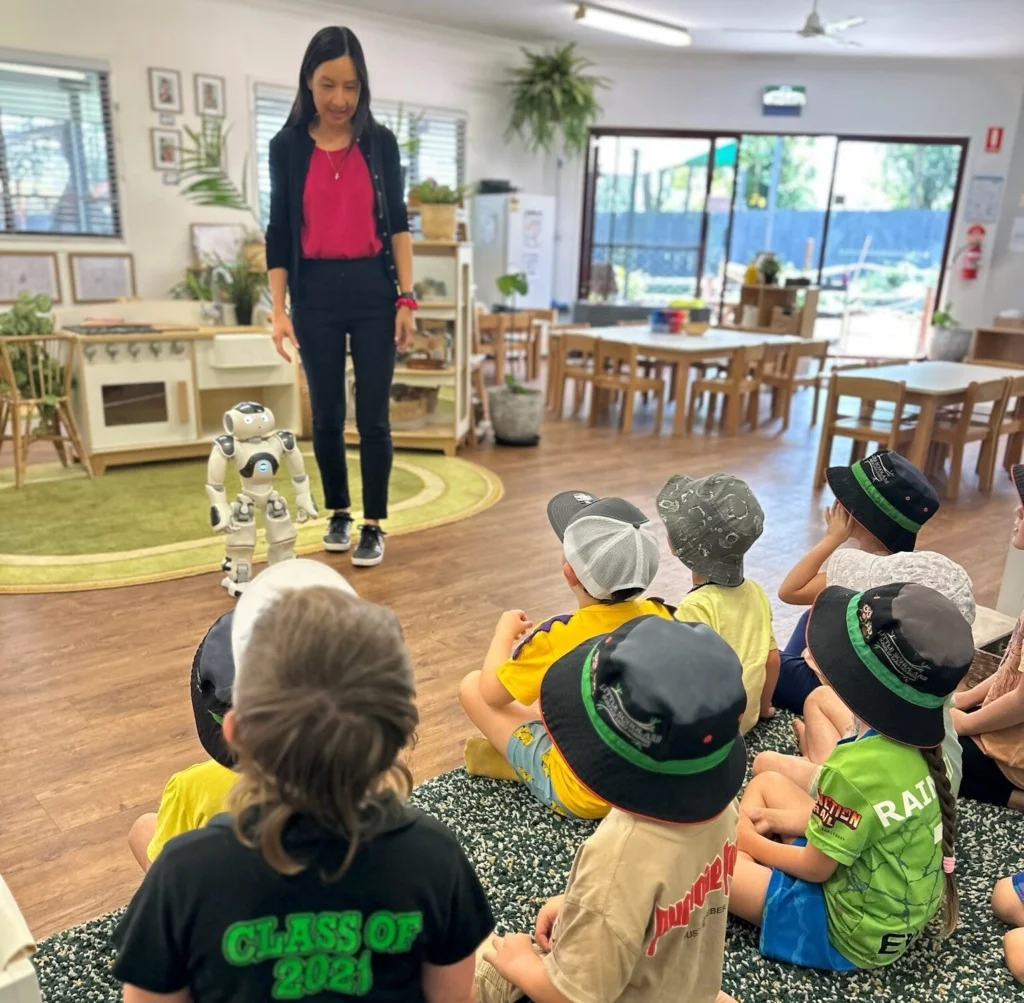
Little Scholars’ Yatala campus was buzzing with excitement as it welcomed Dr Michelle Neumann, Research Assistant Ruby-Jane Barry, and of course, NAO. The visits were part of an educational initiative that captivated the preschool and kindergarten children, as well as educators. The children couldn’t wait to see if Dr. Neumann and NAO had arrived and would dash to the parent lounge to check, educators reported.
The children had the opportunity for one-on-one interactions with NAO, participating in games like ‘Simon Says’, Q&A sessions, and activities focused on literacy.
Dr. Neumann, who leads the project, is an associate professor in early childhood education at Southern Cross University. She believes that this is a frontier that early learning is just starting to venture into.
Interestingly, Dr. Neumann’s journey into early childhood education began after becoming a mum to five children. With an honours degree in science, she decided to pivot her career towards education and early learning. She went back to university, earned her Graduate Diploma in Education, Bachelor of Primary Education, and then completed her PhD focusing on early literacy development. Her dedication has earned her a recent award for research excellence from Southern Cross University, recognising her work in early literacy, digital technologies (tablets, apps, social robots), child development, parent-child interaction.
While NAO has been used to support children’s learning about STEM (Science, Technology, Engineering, Maths) and coding, social robots also have the potential to be used to support language, literacy and social learning in the classroom, according to Michelle
“As a physically embodied version of a screen, a social robot may help young children from a range of diverse backgrounds develop their language and social skills,” Michelle said.
“Michelle and Ruby were so approachable and more than willing to let our little scholars meet NAO,” says Raylene, lead educator in the senior kindergarten room. “I was fascinated with NAO’s abilities, and the potential social robots could have in a classroom setting. As a lead educator, the benefits of having an additional learning assistant was something I was happy to advocate for, so I was quick to start drumming up more families to participate in the visits.”
Raylene said she had a lot of conversations with children preparing them for NAO’s visit, even conversations that maybe one day, the children might have robot friends to help their teachers in the classrooms.
“This was super exciting for the children. I did have to remind them and to the families that it wasn’t happening straight away, but the concept was well received. Families enjoyed the debates of whether it would take jobs from educators, and I enjoyed discussing this with them. By day two, Michelle and Ruby were needing to organise additional days to attend the service due to the influx of families wanting to participate,” Raylene said.
Raylene said on the first day, it was evident that although the children were excited, there were also plenty of nerves. Most of the children participated well, with a small handful quite shy, she said. As the program continued, the children got used to seeing Michelle, Ruby and NAO in the parent lounge, those children who were a little shy to begin with looked eager to have another turn.
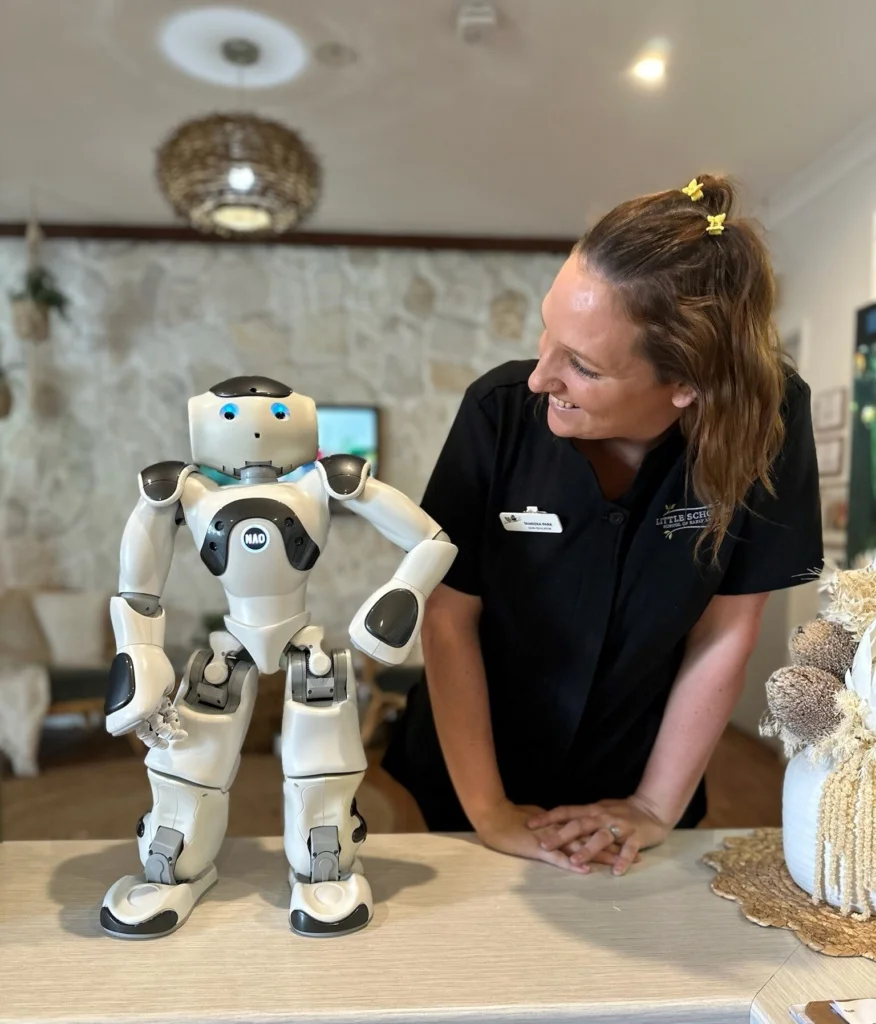
“This was obvious in my own son Tannen. Tannen was one of the few who participated on day one. The whole lead up was a confident ‘I’m having a robot friend’ until he got his robot friend,” Raylene said. “After his turn he told me he didn’t like it a lot because it was scary, however as the days went on, and more friends started to participate, and NAO became a familiar face, all of a sudden he was eager to come to the door to see if they were there yet, and talk to other children on the way in to see if they were going to go and play games with NAO that day. This is the way it unfolded for several children,” Raylene said.
After a few one-on-one visits to introduce NAO to children, Michelle made a final visit to introduce more campus children to NAO and play some games.
“You could see the comfort of the children who were already familiar with NAO, and it acted like a scaffold for the children who hadn’t had the chance yet to interact with him. Comments from children like ‘Oh, that’s just NAO’ and ‘I already played this game and it’s really fun’ to encourage peers along were incredible to hear because it was listening to four- to five-year-olds comforting each other and being confident with the experiences they had just had,” Raylene said.
Michelle said one day she’d love to introduce a full program which sees social robots in more early learning classrooms. But, she says, these are still relatively early days. Social robots are a work in progress, and she acknowledges they’re limited in what they can currently do. She’d love to also work with children who would benefit from additional language and literacy support. For that to work, NAO’s voice recognition needs development as it would need to have the ability to understand a spectrum of language milestones, she said.
“It would take a lot of time, guidance and professional development for educators… and a lot of support to be able to use the social robot in its current form,” she said. “But they’re working on AI generated social robots and these innovative opportunities may make using social robots more usable in the classroom.”
And, the robots are not cheap. NAO can cost up to $20,000 AUD, which she acknowledges would be financially prohibitive to many early learning settings. Michelle says her hope is that more research to can be done to better understand the role that social robots could play in supporting young children’s early learning experiences. With emerging advances in robotics, it may be possible that the production costs of these devices could one day become a more affordable educational tool.
The collaboration between Little Scholars and Southern Cross University has opened up new avenues for early learning, showcasing the potential of integrating social robots like NAO into educational settings. The overwhelmingly positive response from both children and educators alike underscores the limitless possibilities this technology could offer. As we look to the future, the hope is that advancements in AI and robotics will make these educational tools more accessible and tailored to the unique needs of early learners. This pioneering initiative serves as a testament to the boundless curiosity and adaptability of children, and the commitment of educators like Michelle and Raylene to push the boundaries of what’s possible in early education.
Jae Fraser, founder of Little Scholars, wholeheartedly supports the NAO project with Little Scholars.
“This is such an exciting project for our little scholars to engage in,” he says. “Introducing social robots to Little Scholars, isn’t just a leap in technology; it’s a giant step in nurturing young minds.
“We look forward to where this will go, and how we can use resources like this to continue the learning journey for Little Scholars.”
Additional information
The potential of social robots in early learning includes:
Potential barriers and obstacles for social robots in early learning:
Each child comes into the world with a unique temperament, or personal way of engaging with their surroundings. One key aspect of this temperament is how a child reacts to new experiences and people they haven’t met before. While some children are naturally at ease and dive straight into unfamiliar settings, others are more reserved and require additional time and support from attentive adults to feel secure in new situations.
We’ve all encountered them, the little ones who hang back a bit, observing the world from a safe distance before stepping in. Perhaps they clam up and don’t say a word, even when they’re encouraged to say hi. Whether it’s at a family gathering, coming to Little Scholars for the day, a playdate, or even in their own home, these children often take their time to warm up to both familiar faces and new acquaintances. While it’s easy to label them as ‘shy,’ ‘reserved,’ or even ‘standoffish,’ these terms can be misleading and, at times, unfairly stigmatising. The implication with terms like these often is that there’s something wrong with the child or some problem they need to outgrow.
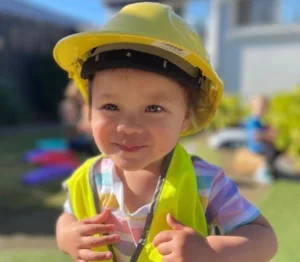
Understanding the nuances of a slow-to-warm-up temperament is crucial, not just for parents but for anyone who interacts with children. These children aren’t necessarily shy or unsociable; rather, they have their own unique way of engaging with the world around them. And contrary to some misconceptions, their reserved nature isn’t a sign of rudeness or obnoxiousness. These children simply need time to observe a situation, time to figure out how things work, space to decide whether they feel comfortable with someone, and respect for their right to move at their own speed. In fact, if they feel pressured to change, then they can turn into shy people, as shyness often is based in a fear of being judged negatively.
Research tells us the brain grows tells us that children learn best when they feel safe and relaxed. Feeling safe helps their brains become more flexible, making it easier for them to learn new things. On the other hand, stress and worry can make learning more difficult. So it’s important to create safe and comfortable spaces where children can focus on learning. For all the reasons above, children who warm up to others gradually are precisely those who could benefit the most from a little extra understanding and support from parents, caregivers, and other trusted adults in their lives.
One American study evaluated the usefulness of slow-to-warm-up temperament as conceptualised by Thomas and Chess in predicting child and maternal parenting behaviors, with a particular focus on its conceptual link to child inhibition. The study included 1,072 mothers and their children in the NICHD Study of Early Child Care and Youth Development. The study found that slow-to-warm-up temperament in infancy did predict later inhibition. Specifically, ‘shy’ toddlers whose mothers are overprotective or overly forceful demonstrated more inhibition in childhood than shy toddlers whose mothers do not demonstrate such parenting styles. The study also found that maternal sensitive and stimulating/supportive parenting was associated with less shyness in early childhood for children who were slow-to-warm-up in infancy.
It also found slow-to-warm-up infants with high quality interactions with their mothers may be less likely than slow-to-warm-up infants with low quality interactions with their mothers to demonstrate inhibition in early childhood. So while it may be hard for parents who are not slow-to-warm up themselves to understand their child’s feelings, it’s important for them to understand what their child needs to feel comfortable. The style of parenting used with a slow-to-warm up child can affect them long into childhood and beyond.
So, how can we create an environment that not only respects their natural disposition but also empowers them to overcome feelings of anxiety or discomfort? How can we help them muster the courage to engage more freely with others, enriching their social experiences and emotional development?
Children who are slow to warm up often feel more at ease when they know what’s coming. This could be anything from going to a friend’s birthday party to a visit to the dentist. You can help them get ready by:
Before going into a situation you suspect might be hard for your child to warm up, prepare them for what they can do when they get there by saying something like, ‘when we walk in, it may feel like a lot of people are there, when everyone comes to say hi, if you’re not ready, you can smile and wave.’
When in the moment where your child is still assessing the situation they’re in, you could say to your child something like, ‘You don’t have to answer, but if you want to, here’s a game. If you’re having a good time at this party, touch your nose, if you’re not, stomp your feet!” This helps warm the child up without feeling like they have to speak and help them get past the feeling of ‘freezing up’ and you might even get a smile out of them.
Being someone who is a little more gradual in building comfort around others is not a negative trait, and it shouldn’t be treated as such. Children who are slow to warm up possess a unique set of strengths that make them truly special. Not only are they keen observers, picking up on nuances that might escape others, but they also demonstrate exceptional impulse control, carefully considering their actions before taking the plunge.
While they may have a selective circle of friends, their loyalty to those with whom they connect is unwavering. Their empathetic nature allows them to tune into the feelings of others, making them excellent listeners and compassionate companions.
Once they find their comfort zone, these children are every bit as joyful and adventurous as their peers. Additionally, their cautious approach often makes them excellent problem-solvers, as they take the time to assess situations thoroughly. Their introspective nature also lends itself to deep thinking, allowing them to engage meaningfully in activities and conversations.
There’s an opportunity there to lift up the cautious child as you observe them in these situations. Maybe by telling them you admire how they read the room before they move forward, or highlighting when they took a big step of approaching someone first, then asking them how they felt afterward. This shows your child you’re always in their corner, and helps them build up those feelings of safety and confidence.
Kristen, a lead educator in the early learner studio at Little Scholars Pacific Pines, says that building relationships through play is key, especially when a child starts with us for the first time.
“Play is the language of children,” Kristen says. “We are always on the child’s level offering support and companionship without expecting them to return or respond immediately. Through observations and learning stories we share how we celebrate even the smallest achievements such as a child engaging in a group activity alongside peers.”
Kristen says family involvement is really important, as our families know our little scholars best.
“We remember that every child is unique, and the key to helping slow-to-warm-up children is individualised attention and care. We work closely with families to bring children’s interests and special talents from home into their Little Scholars environment.”
Raylene, lead educator at our Yatala campus, agrees.
“One of the most useful, however overlooked strategies that I’ve used in my time as an educator is to build strong relationships with parents. When children see their parents positively engaging with a person, they begin to see that person as someone they too can connect with. Having a good relationship with families also provides the platform to initiate open, meaningful and welcomed communications whether it’s light social banter or a need to develop collaborative care strategies for their child.”
Ray also says it’s important for educators, parents and other people who interact with children to attune themselves to the child’s temperament.
“As educators it’s crucial to ensure that we are attuning to the children in our care at every stage of their life so they feel recognised and supported to become the capable little humans they were born to be at a pace that is natural for them.
“We can do this by being intentionally present in our interactions, which in turn gives us the opportunity to identify their emotional cues whether it’s from their words, behaviours or body language. We can continue developing this safe space for children and support them to feel seen, heard, understood and validated by ensuring we are genuinely responsive; actively listening to them and addressing their need in a way that allows them to feel content. It’s about not only recognising, but facilitating for each child as the individuals they are to build a trusting relationship and safe environment.”
Understanding and supporting children with a slow-to-warm-up temperament is a collective effort that involves parents, caregivers, and educators. At Little Scholars, we’re committed to creating an environment that respects and nurtures each child’s unique way of engaging with the world. By taking the time to understand these special little ones, we can help them flourish, turning their cautious observations into confident explorations. Rather than treat your child’s temperament as something that should be excused or apologised for, we should celebrate the strengths of these thoughtful, empathetic, and deeply introspective children, and offer them the understanding and support they deserve. After all, they might just be the careful thinkers, loyal friends, and compassionate leaders of tomorrow.
We know it can be hard to come up with easy, quick things to do with your children, so we thought we’d share a favourite of our little scholars. Learn how to make your own moon sand in minutes with a few of these kitchen staples!
Preparation Time: 5 minutes
Cooking Time: None
Did you know that clay is not only a fun material for children to play with but also incredibly beneficial for their development?
What’s fantastic about clay is its open-ended nature. There’s no right or wrong way to play with it, giving children the freedom to explore and express themselves. Whether they’re rolling it into balls, flattening it into pancakes, or creating intricate sculptures, each action reveals something unique about them. It could be their level of focus, their creativity, or even how they approach problem-solving.
Benefits include:
These are all important skills for children, especially as they prepare to move into formal education. The benefit of using clay is that it’s a natural, moldable medium that can be used as a cement, an adhesive and even a paint.
Paul R White, an American clinical social worker, has been using clay as a therapeutic tool for over 30 years. In his book, CLAYtherapy, he talks about how clay play can naturally facilitate meaningful conversations between children and adults. He developed numerous unique aids and techniques that have assisted him in teaching children to cope with stress, express feelings and to solve problems, including through the use and manipulation of clay. White also presented a paper on clay therapy to the World Congress of Child Play Therapy and Child Psychotherapy in London, England.
He has used clay in his practice as an ice breaker, as an aggression reliever and as a primary tool in treatment.
In his book, White says “Through mutual clay play, a conversation between child and counselor automatically emerges. Dialogue doesn’t have to be forced or fabricated, but happens naturally when the counselor is revealing, demonstrating and teaching this dynamic and engaging clay process and the child is asking, learning and experiencing his or her own trial and error. This manner of interaction links the adult with the child through a hands-on, verbal, nonintrusive, problem-solving counselling process.”
Lisa Terreni, a senior lecturer in early childhood education, also champions the use of clay. She believes it gives children another language for expressing their thoughts and ideas.
“From many anecdotal observations of children using clay I feel strongly that, apart from teaching young children the physical skills required to use the medium successfully to create three dimensional artworks, using clay gives children another language for expressing their thoughts, ideas and emerging working theories about their world,” she said in a blog post for Early Arts.
Marvin Bartel, a professor of art at Goshen College in the United States, says in a blog post on his website that ‘clay is so fascinating that some children work for long periods without any adult motivation to maintain their interest. It can be a great way to extend the attention span of some children.’
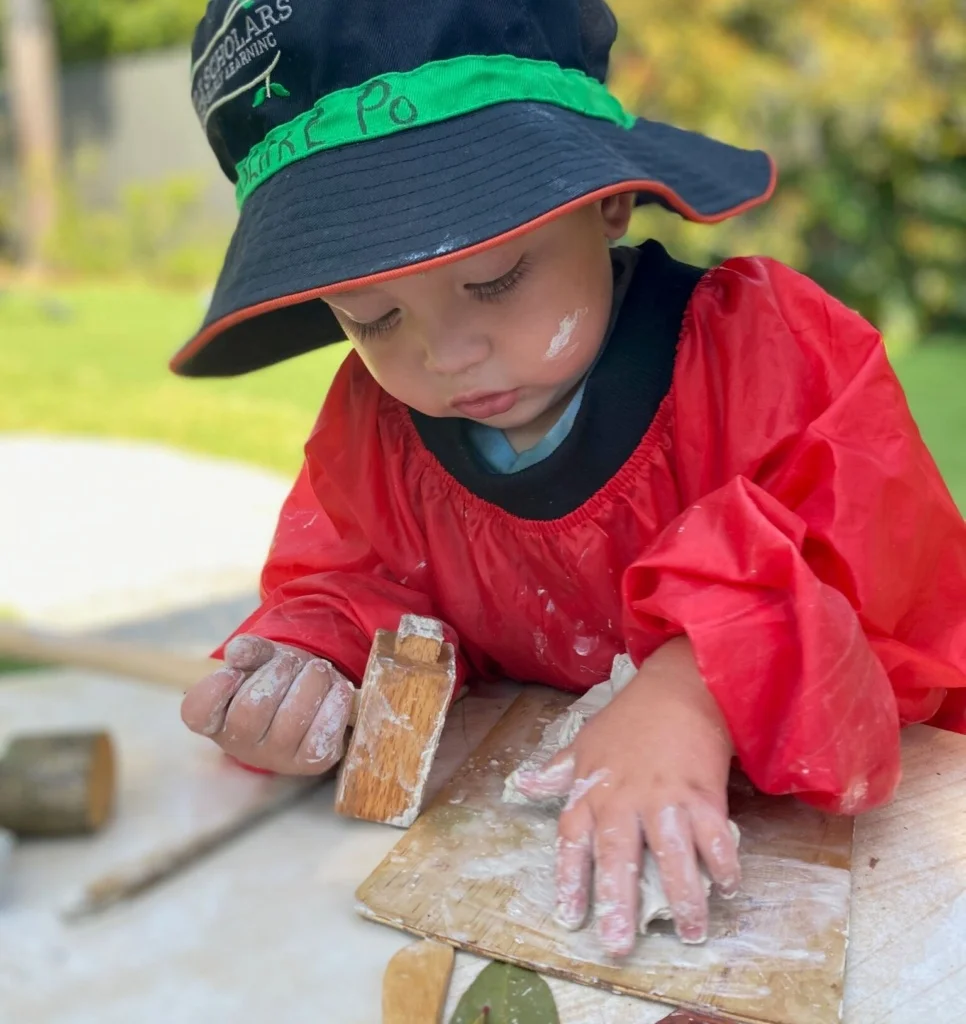
According to experts from Pennsylvania State University, children will show many parts of themselves through clay experiences:
One of the lesser-known but incredibly important benefits of clay play is muscle development. When children manipulate clay, they’re actually engaging both fine and large muscles, which is crucial for their physical development.
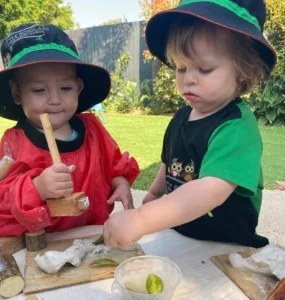
Anxiety
One study in Iran aimed to examine the impact of clay therapy and narrative therapy on reducing anxiety levels in pre-school children. The study involved 30 kindergarten children who were divided into three groups: 10 in the clay therapy group, 10 in the narrative therapy group, and 10 in the control group. The study found significant differences in anxiety levels among the groups. Both the clay therapy and narrative therapy groups showed a reduction in anxiety compared to the control group. The clay therapy group had a mean score of 3.63, and the narrative therapy group had a mean score of 2.83, both of which were significantly different from the control group’s mean score of -0.71. However, there was no significant difference between the clay therapy and narrative therapy groups in terms of anxiety reduction.
The study concludes that both clay and narrative therapies are effective in improving self-esteem, school performance, and sociability of the children, as reported by the parents.
Psychosocial Wellbeing
Another study out of Kenya, looked at how clay play supported children who lost access to schools during the pandemic, affecting children’s right to education and their psychosocial wellbeing.
The study, published in the East African Journal of Arts and Social Sciences, looked into the psychosocial effects of the COVID-19 pandemic on children and how play, particularly with painting and clay modelling, can be a therapeutic and educational tool. The paper argues that these forms of play can help children cope with the stresses and traumas induced by the pandemic, while also promoting cognitive and social learning.
The study argues that play with art forms like painting and clay modelling can be powerful tools for cognitive and social learning. They can also serve as therapeutic activities to counter depression and violent behaviour. Activities such as clay modelling and painting are described as non-serious activities that free the mind and are excellent for expression. Clay is described as a malleable material that can be easily manipulated, while painting offers a colourful medium for expression.
The study suggests that these art-based activities should be integrated into the curriculum, especially for children aged four to six, to enhance their psycho-motor and creativity development.
Fine Motor Skills
An Indonesian study investigated the impact of constructive play with clay on children’s fine motor skills. The small study by researchers from STKIP Kusuma Negara included two groups of 11 children each, one as the experimental group and the other as the control group. The study used test observation techniques for data collection and employs both descriptive and nonparametric statistical analysis. The results indicated a significant difference between the two groups, suggesting that constructive play with clay positively impacts children’s fine motor skills.
In the study, the authors highlight the physical aspects of working with clay.
“Working with clay fosters large muscle and fine motor control. Clay is fairly resistant and will need to be kneaded and worked to make it pliable. Children can stand or sit while using clay. Standing provides the advantage of a whole-body muscular reaction to the clay. Hard clay provides solid resistance the child must overcome. This will involve using the shoulders, arms, hands, and fingers. Playing with clay develops large muscles and fine motor control because the clay is quite resistant and kneaded to make it soft.”
The benefits of clay play in early childhood development are supported not only by expert opinions but also by a growing body of scientific research. From fostering creativity and social skills to enhancing both fine and large muscle development, clay play serves as a multifaceted educational tool.
References:
At Little Scholars, we have four pillars that underpin everything that we do at Little Scholars – for our children, families, educators, and our community.
As part of our annual awards, we have four awards dedicated to those Little Scholars’ values – learn, grow, inspire and contribute. This year, while our award-winning educators certainly personify all four pillars, but with their unique special skills and achievements, we’ve declared one clear winner for each pillar.
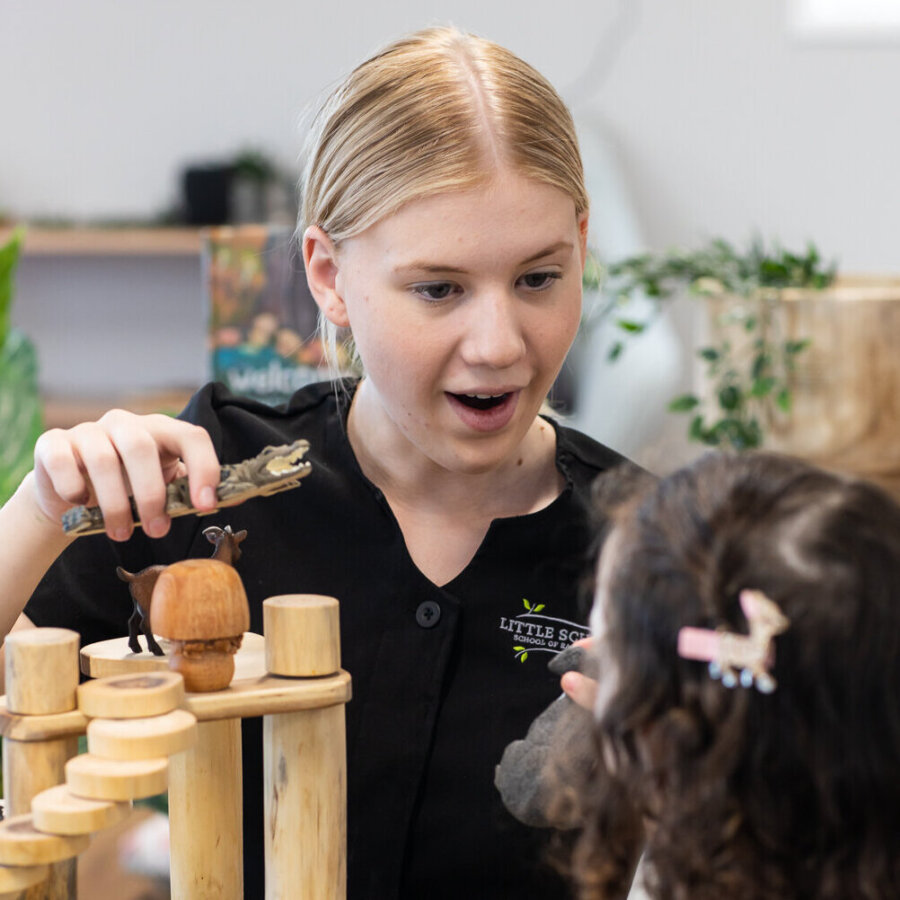
Ellissa at our Ormeau Village campus was named winner of the Pillar Award in the Learn category because she stepped up to become a lead educator, and she is happy to keep learning from her peers and further her education in the sector.
Ellissa is finishing up her studies with her Cert III, then she’ll be moving onto her Graduate Diploma.
From her submission: Ellissa has stepped up into her Lead role during last year and we have watched her grow from assistant to well-deserved Lead and take charge in her space, leading her colleagues while taking feedback on board and striving to excel.
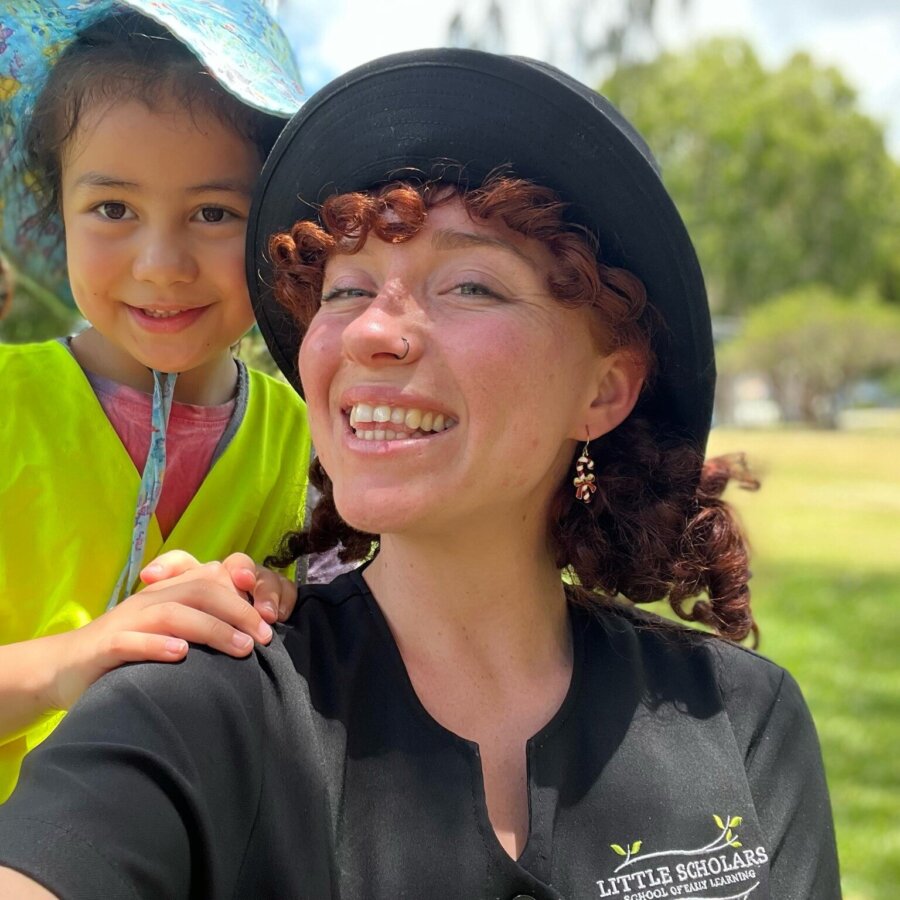
Ella’s experience as a parent with a child at Little Scholars was actually the reason she became an educator herself! Ella is the recipient of an Inspire Little Scholars Pillar Award 2023.
Ella’s nomination
Ella is an educator with the Little Scholars Deception Bay campus, which recently was assessed Exceeding under the National Quality Framework for Early Childhood Education and Care.
In Ella’s nomination to us, it said, “Ella is an inspiration for all in the Deception Bay community. We had some outstanding feedback from the department through our assessment and rating process. Before the process even started, the assessor had mentioned the passion and authenticity observed in Ella’s interactions with our children, families and community. In the assessor’s words – ‘she could sit and watch Ella all day long.’ From one of Ella’s colleagues, ‘the educator she is, is who I aspire to be in my future teaching career. She is strong, but also so caring to each individual child.’
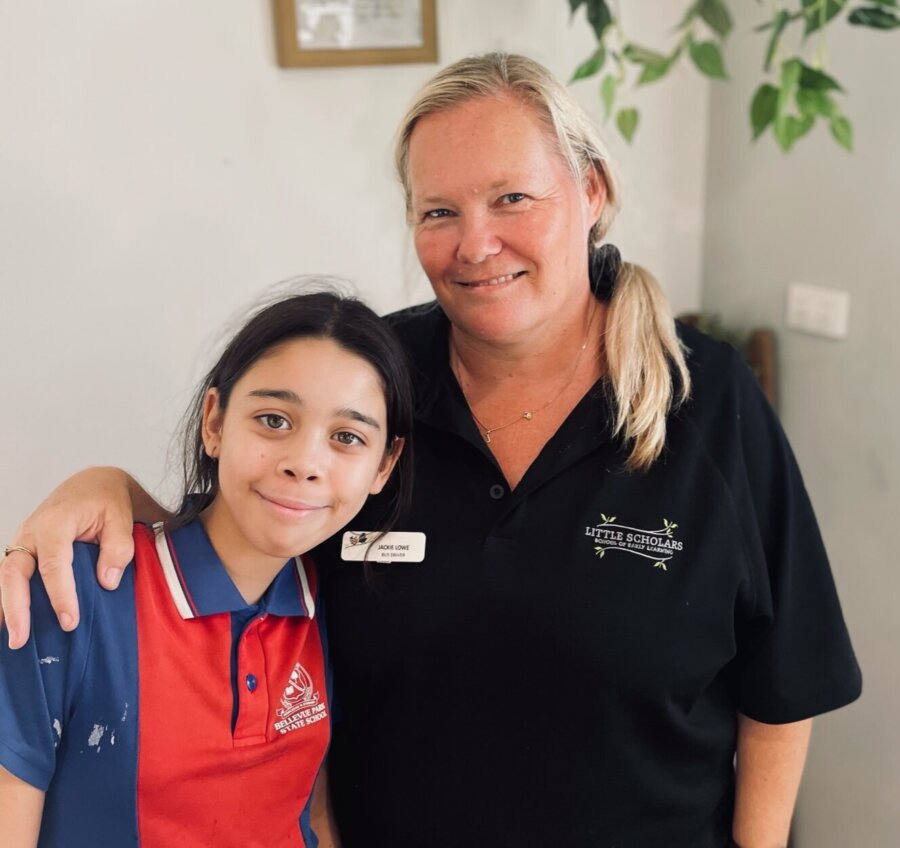
Jackie is an educator at Little Scholars Ashmore campus. In her first year working for us, she was nominated for a Pillar award!
Jackie’s nomination
Campus manager Elise said, ‘Jackie is our jack of all trades! Jackie fits many hats at our campus. From driving the bus to being in the studios to going on vacation care, she wears her many hats with a smile on her face. Her bubbly nature and willingness to help the team wherever needed is admirable. We appreciate her dedication and consistent contribution to the campus.
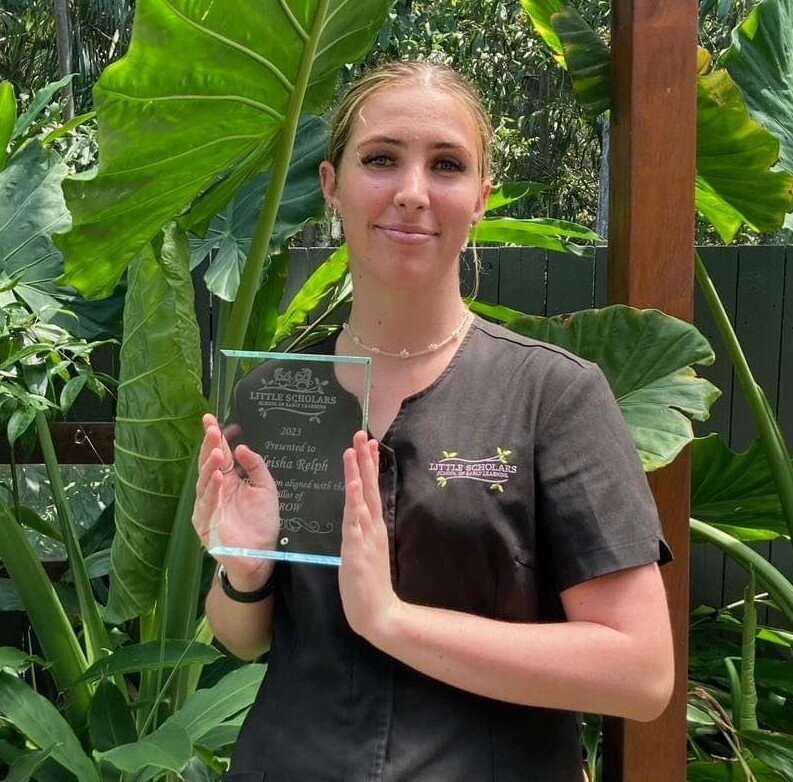
Aleisha has remarkable attributes and we’re told her growth as an educator has been propelled by her enthusiasm to contribute, learn and inspire her team and go above and beyond not only for children, but families as well.
I have been an educator since the end of January 2020. Prior to this, I was a trainee at Little Scholars Nerang since September of 2018 studying my Diploma.
Aleisha’s nomination
Aleisha at our Nerang campus was named winner of the Pillar Award in the Grow category because she’s grown from a trainee at the campus just a few years ago to now full time lead educator, her gentle touch, her willingness to inspire and help others, she was a clear choice for campus manager Renee.
Aleisha is no stranger to accolades, she won Educator of the Year – Peer Choice twice previously. Little Scholars was her first employer in her early childhood education career!
When you think of childcare, you might not necessarily think of early education, but that’s precisely what Little Scholars is doing; providing high calibre early education for the critical first five years of a child’s life, and at the same time, changing society’s perception of what childcare, or early education, is.
Little Scholars has always considered itself as a leader in the sector, but we elevated the quality of education with the addition of Susan Cooper, our group pedagogical leader one year ago.
Pedagogy is a form of teaching strategies in the practice of educating. It’s the techniques, strategies and approach taken by educators to let learning and development to take place. Pedagogy refers to the interactive process between the educator, the learner and the learning environment and provides reason to the design of learning spaces, materials, and resources on offer. Pedagogical leadership supports educators in relating their pedagogy to content knowledge and educational theories.
My aim is to support educators in entering the child’s world, enabling them to reflect on their practices and build capacity to support the child’s development.
– Susan Cooper, group pedagogical leader for Little Scholars
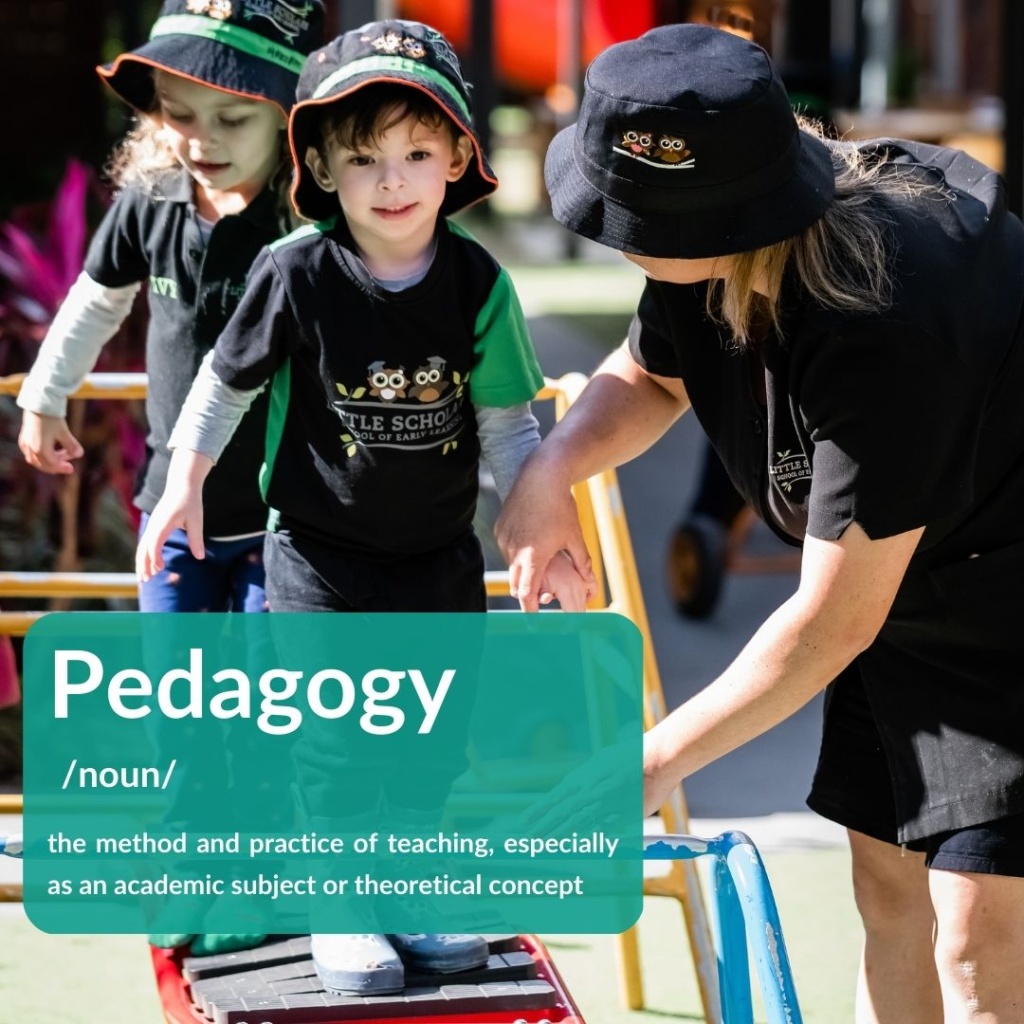
In the year since Susan joined us, she’s gone above and beyond to support our educators. Through her pedagogical leadership, Little Scholars has raised the benchmark of its overall quality of teaching, and recognises that providing children with strong foundations for ongoing learning and development is underpinned by a strong pedagogical practice. She inspires educators to employ new approaches to their teaching against up-to-date research, has helped translate the Little Scholars values and principles into practice and has without a doubt increased the quality of experiences and interactions across our campuses.
But the role was daunting at first, according to Susan.
“Having come with approximately 16 years’ experience in having been in varied roles across the sector within early childhood, my love of sharing knowledge and inspiring others drew me to apply to this role,” Susan says. “My experience in playwork allows me to see the true value in children’s play, the need to create spaces and support the learning and approach to working with children to support and facilitate play in its true essence. What really resonated with The Scholars Group and my own personal values and beliefs, was placing children as the core and central to all that we do.
“I see myself as an advocate for children’s rights, being the voice for many and striving to excel toward quality outcomes.”
The group pedagogical role is focused on mentoring and guiding teams in their practices and challenging new ways of working, to support innovative curriculum ideas, while supporting children’s learning across all Little Scholars campuses.
“I found the team to be so supportive and receptive to change, which has allowed me to share my vision, passion, and skillset,” Susan says.
With Susan’s support, our Deception Bay campus was rated exceeding against the National Quality Standards (NQS) in late 2022. A thrilling result, but not without a lot of preparation. Susan guided Nat, the campus manager, and her team, in the Assessment and Rating Process.
“It was critical that the team worked collaboratively toward a shared goal. This involved building strong relations with the team to build trust and mutual respect. This partnership saw me engage with all stakeholders, while we worked toward targeted goals and worked through evidence-based data to the exceeding themes,” Susan says.
Strong knowledge of theory and pedagogy underpinned the quality outcomes, according to Susan. Another great achievement Susan says, was the team being ranked 3rd out of 3,126 early learning centres across the state.
“My role is to take an active role in the development of pedagogy in the early childhood context. I primarily work alongside teams, across our 13 campuses to provide the opportunity to share pedagogical practice, leading knowledge to research and child development,” Susan says. “Not only does pedagogy inform direct work of teaching, but also the more indirect work of leadership. This develops a community of practice, where professional educators can share ideas and knowledge and engage in peer learning.”
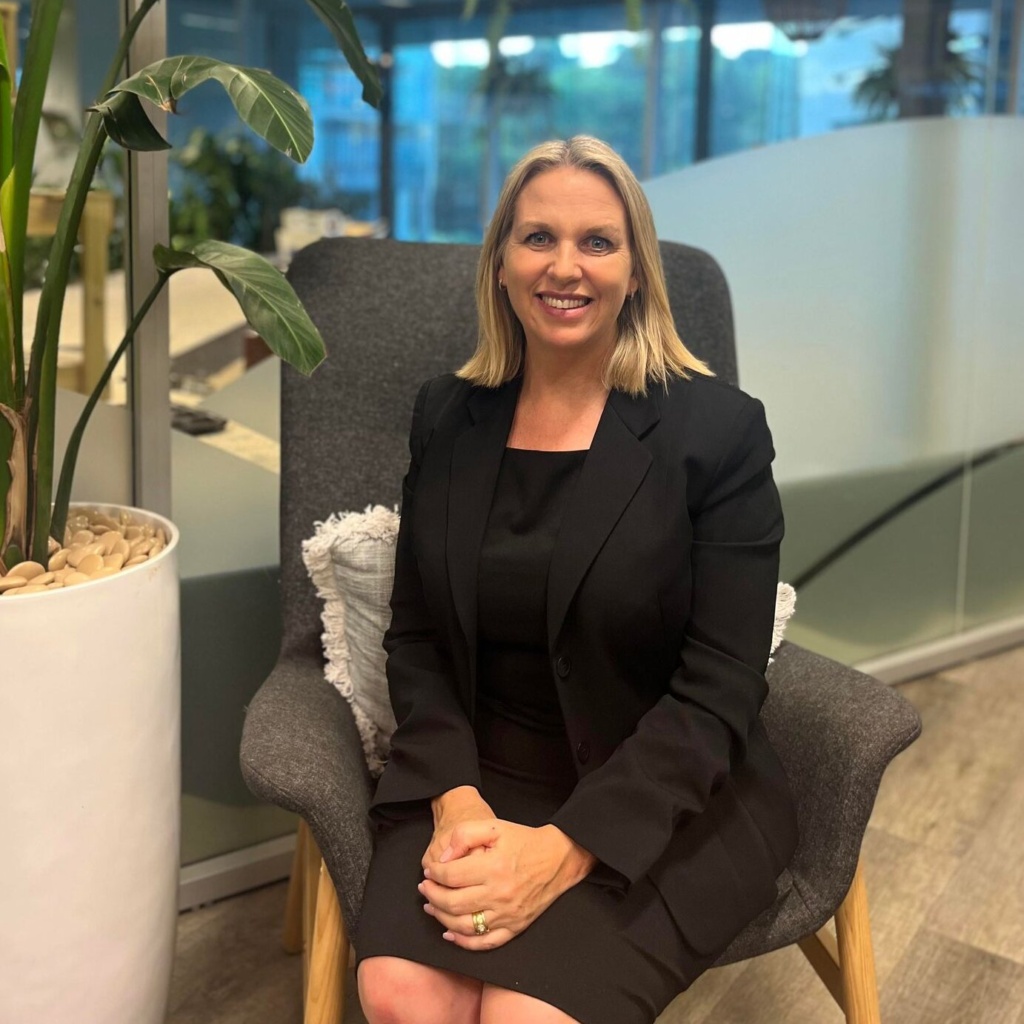
“Little Scholars has always been a leader in our field, due to our commitment and passion to the early years. With the addition of our Group Pedagogical Leader, the effectiveness of our educational program and practice has been elevated to a level we didn’t think was possible,” says Jae Fraser, founder of Little Scholars.
“In Susan’s role she is supporting and mentoring the team to influence children’s learning by fostering family engagement, ensuring fidelity to the Little Scholars curricular philosophy, using data to evaluate the effectiveness of our learning program, and exceeding standards established to optimise learning effective environments,” says Jae. “We couldn’t be happier with the results of this new role just after one year, and we are so excited to see the future.”
Susan’s goals for her role are simple: to continue to strive toward excellence, raising the benchmark in early childhood and placing children at the forefront of everything Little Scholars does.
“I take great pride in the relationships I’ve developed, the partnerships I have established, creating a safe space for the children and educators I work with,” Susan says reflecting on the past year. “Our impact is significant, and I’m thrilled to witness the progress in both the children and educators. I feel grateful to be part of such meaningful work, knowing that we’re making a real difference in the lives of these children.”
At Little Scholars School of Early Learning, we’re dedicated to shaping bright futures and instilling a lifelong passion for learning. With our strategically located childcare centres in Brisbane and the Gold Coast, we provide tailored educational experiences designed to foster your child’s holistic development.
Let us hold your hand and help looking for a child care centre. Leave your details with us and we’ll be in contact to arrange a time for a ‘Campus Tour’ and we will answer any questions you might have!
"*" indicates required fields